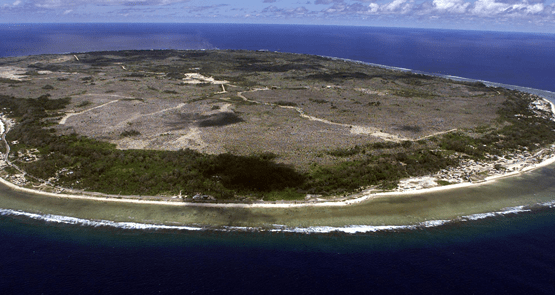
Children who could be sent back to Nauru as a result of yesterday’s High Court decision have told the Human Rights Commission that the island nation is “hell on Earth”, as the commission pleads with the government to let them stay.
The High Court yesterday ruled 6-1 in favour upholding the Australian government’s legislative framework to allow offshore detention of asylum seekers in Nauru. The court’s decision hinged on last-minute legislative changes the government made in June 2015 to retrospectively permit offshore detention. The government also had a hand in ensuring that Nauru became an “open centre” detention arrangement on the eve of the High Court case last year in order to argue that the asylum seekers on Nauru could not be considered to be in detention.
As a result of the decision, 267 people, including 37 babies and 54 other children, could be sent back to Nauru as soon as this weekend.
Some of the children who could be sent back spoke to the Human Rights Commission and paediatricians last year as part of a report released today by Human Rights Commission president Gillian Triggs, more than a year since the Forgotten Children report. The report includes interviews with 15 parents and 69 children who have spent time on Nauru, and could now be sent back. They told the commission that Nauru was “hell”:
“Hell, nightmare”
“Worst place in the world”
“Nauru is Hell on Earth. Before we die we have seen hell”
Detainees reported there were mice, rats, and cockroaches in the detention centre, and it was over 55 degrees inside the tents. Although detainees are now free to come and go as they please, detainees reported they didn’t feel safe, especially after 6pm, when they risked assault, theft and rape for leaving the detention centre. Aside from that, there was not much on the island for them to do: “It is a very small country. There is nowhere to go, nothing to do.”
The commission assessed the mental health of 20 children who had lived on Nauru for between three and 17 months, and found 19 out of 20 were in the clinical range for being a risk for post-traumatic stress disorder. Despair and hopelessness were high among the children interviewed. The paediatricians reported that the children they interviewed were “amongst the most traumatised children” they have ever seen.
Dr Hasantha Gunasekera said in a statement some children were suicidal:
“We were deeply disturbed by the numbers of young children who expressed intent to self-harm and talked openly about suicide and by those who had already self-harmed.”
In a speech this morning, Triggs said the report had been given to the government in November, but it had yet to act on it. The commission has recommended the children be removed from detention and placed into community detention in Australia and be granted a bridging visa. The HRC recommends none of them be returned to Nauru.
“Nauru is an inappropriate place for asylum-seeking children to live, either in detention or in the community,” the report stated.
In an interview with ABC’s AM program this morning, Immigration Minister Peter Dutton would not say if or when children would be sent back to Nauru, but said that the government would work through each, case by case. Dutton said the government had significantly reduced the number of children in detention from a peak of 2000 down to less than 80 today.
While the High Court upheld the Australian legal framework for the government’s offshore detention system, Triggs said Australia still needed to meet its international obligations:
“There is a widening gulf between the constitutional powers of the Australian government and the country’s international legal responsibilities. Our national laws, in effect, allow us to wash our hands of the welfare of refugee children once they leave Australia’s shores … Now it seems, it rests with the international community to use its influence to ensure the safety of refugee children under the agreed principles of international law.”








Gillian Triggs . . an excellent stand-in for Australian of the Year!
Listening to Turnbull & Dutton in today’s Question Time suggested little mercy for the minors due to be banished to Nauru.
Turnbull has shown his true colours.
It is bipartisan bastardry. This is what happens when political hacks homogenise into an amorphous, indistinguishable mush.
Vote Independent & Green.
In an interesting twist, I notice that the more harrowing stories such as the young boy who came here for treatment after being r*ped and terrified to go back to where his attacker is still free, are now not being mentioned, even by the ABC.
And yes graybul, Gillian Triggs should be Australian of the Year.